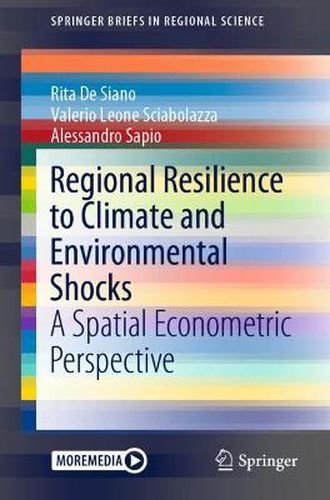Readings Newsletter
Become a Readings Member to make your shopping experience even easier.
Sign in or sign up for free!
You’re not far away from qualifying for FREE standard shipping within Australia
You’ve qualified for FREE standard shipping within Australia
The cart is loading…






This title is printed to order. This book may have been self-published. If so, we cannot guarantee the quality of the content. In the main most books will have gone through the editing process however some may not. We therefore suggest that you be aware of this before ordering this book. If in doubt check either the author or publisher’s details as we are unable to accept any returns unless they are faulty. Please contact us if you have any questions.
The book illustrates the use of spatial econometric models to analyze the economic resilience of regions to climate-related shocks. Although climate change is a global externality, climate anomalies can trigger locally disruptive shocks, whose adverse effects on economic growth are transmitted through neighbouring relationships (based on geography, trade, or technological bonds). After laying out the theoretical case for spatial analysis in the study of economic resilience, the book introduces spatial econometric models, their estimation and testing procedures, as well as applications of spatial econometrics in various domains. It then reviews the current literature on the role of space in the propagation of climate shocks, and discusses how adaptation and mitigation policies can leverage spatial dependencies, with a special focus on renewable energy technologies and agricultural productivity. It appeals to scholars of regional and spatial sciences and econometrics as well as those interested in the spatial effects of climate and environmental shocks.
$9.00 standard shipping within Australia
FREE standard shipping within Australia for orders over $100.00
Express & International shipping calculated at checkout
This title is printed to order. This book may have been self-published. If so, we cannot guarantee the quality of the content. In the main most books will have gone through the editing process however some may not. We therefore suggest that you be aware of this before ordering this book. If in doubt check either the author or publisher’s details as we are unable to accept any returns unless they are faulty. Please contact us if you have any questions.
The book illustrates the use of spatial econometric models to analyze the economic resilience of regions to climate-related shocks. Although climate change is a global externality, climate anomalies can trigger locally disruptive shocks, whose adverse effects on economic growth are transmitted through neighbouring relationships (based on geography, trade, or technological bonds). After laying out the theoretical case for spatial analysis in the study of economic resilience, the book introduces spatial econometric models, their estimation and testing procedures, as well as applications of spatial econometrics in various domains. It then reviews the current literature on the role of space in the propagation of climate shocks, and discusses how adaptation and mitigation policies can leverage spatial dependencies, with a special focus on renewable energy technologies and agricultural productivity. It appeals to scholars of regional and spatial sciences and econometrics as well as those interested in the spatial effects of climate and environmental shocks.